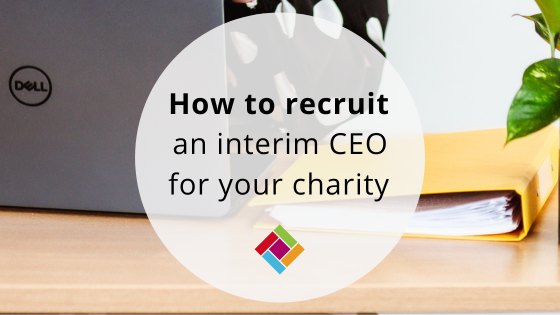
Finding yourself an interim leader can be daunting, particularly with limited recruitment resources and budgets. Where do you start and how can you find good talent on a budget?
What’s the value of interim leadership?
An interim CEO can bring unique advantages. Attracting a seasoned professional with experience across multiple sectors or organisations usually means they hit the ground running and take over the reins immediately.
Whilst traditional recruitment typically can be expensive, there are several cost-effective ways to find qualified interim leaders.
- Network through sector-specific channels – leveraging existing connections within your sector is a great way to find interim talent. Board members, fellow CEOs and professional contacts often have valuable recommendations. The charity sector is collaborative by nature, and many experienced professionals are happy to share jobs with their networks.
- Use LinkedIn and professional groups – LinkedIn can be a valuable tool for finding interim executives. Join relevant non-profit leadership groups and post your requirements. Many interim executives maintain active LinkedIn profiles and regularly engage with sector-specific content. Search for professionals who have interim experience in similar organisations. Facebook also has a number of groups, such as small charity CEOs or join online communities like Charity Connect.
- Consider specialist interim providers – whilst this will involve a fee, it could be cost-effective in the long run. Candidates will be pre-vetted and contractual arrangements will be handled by the provider. Also, providers will have an extensive network of experienced candidates who are ready to hit the ground running and will understand your challenges.
Understanding and managing costs
It’s essential to be transparent about budget constraints and be upfront when engaging with interim providers or candidates. Request comprehensive day rates that include all expenses to avoid unexpected costs. A clear breakdown should include:
- Base daily rate
- Travel expenses
- Additional costs (such as meeting expenses or materials)
- Agency markup (if working through a provider)
For example, if an interim executive charges £400 per day and the provider bills £550, you’ll clearly see the £150 provider markup for their services. This transparency helps with budgeting and ensures all parties understand the financial arrangement.
Getting the best value for money
Don’t automatically dismiss candidates who can only offer part-time availability. Many experienced interim CEOs work effectively on a three or four-day week basis. Their expertise and efficiency often mean they can accomplish more in a limited time than a full-time less experienced leader.
Making the appointment work
Communication is key. Staff should be briefed on what the new CEO role will entail to allay any concerns they may have. The mention of the word ‘consultant’ can cause anxiety among team members, who may fear that it means an organisational review or worse still, redundancies. Instead, emphasise that the role of the interim leader is to:
- Maintain stability within the organisation
- Support operations
- Prepare for the permanent transition
- Share their experiences and best practice
Setting expectations
Effective onboarding is key to the success of the appointment, which means having a clear brief in place for the interim position before they even begin. This should include:
- Specific objectives for the interim period
- Expected time commitment
- Key stakeholder relationships
- Decision-making authority
- Reporting requirements
Questions to ask when recruiting
Once shortlisted, think about whether the candidate will be the right fit. It can help to ask detailed questions about:
- Their experience in the charitable sector
- Their vetting process for interim executives
- References from similar organizations
- Their fee structure and payment terms
- Support provided during the assignment
Documentation and contracts
Document all arrangements made with the interim candidate so that you have a record of everything agreed. This includes:
- Daily rate and expense structure
- Payment terms and invoicing requirements
- Duration of assignment
- Notice periods
- Key deliverables and performance measures
How do you measure success?
Just as you would manage other employees, it’s important to reflect and review to understand whether objectives are being met. This will also give you the opportunity to discuss any challenges or concerns from both parties, adjust the priorities if needed, and help you plan for permanent recruitment.
A well-chosen interim CEO can bring numerous benefits including stability during transition periods. They can offer a fresh perspective on organisational benefits and transfer their knowledge to existing staff.
Recruiting an interim CEO doesn’t have to break the bank. By being clear about your needs and budget, utilising cost-effective search strategies, and maintaining transparency in financial arrangements, you can secure experienced leadership to guide your organisation through transition periods.
Remember that a good interim provider will be happy to explain their processes and fees, and the right interim CEO can add significant value even on a part-time basis.
The key is to approach the process systematically, communicate clearly with all stakeholders, and focus on finding someone with both the right experience and understanding of the charitable sector’s unique challenges. With careful planning and clear expectations, an interim CEO can help steady your organisation and prepare it for its next chapter of leadership.
Key takeaways
- Cost-effective recruitment
- Leverage charity sector networks and LinkedIn
- Consider specialist interim providers for pre-vetted candidates
- Part-time interim CEOs can offer excellent value
- Setting up for success
- Ensure transparent cost structures and clear contracts
- Establish specific objectives and deliverables
- Maintain open communication with stakeholders
- Long-term benefits
- Immediate leadership stability
- Fresh perspective on organisational challenges
- Expert knowledge transfer to existing staff